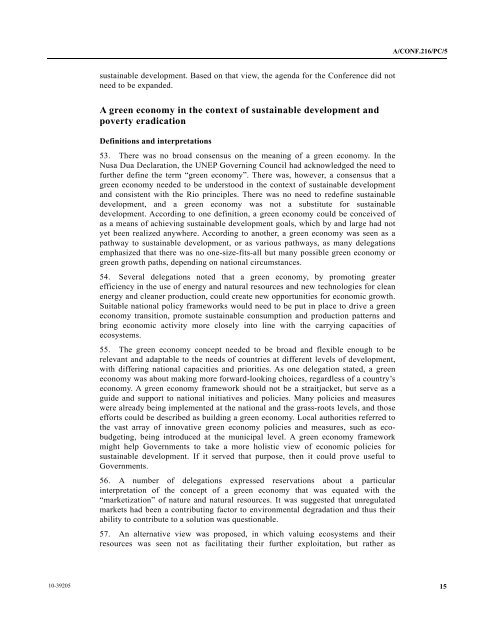General Assembly - UN Documents
General Assembly - UN Documents
General Assembly - UN Documents
Create successful ePaper yourself
Turn your PDF publications into a flip-book with our unique Google optimized e-Paper software.
A/CONF.216/PC/5<br />
sustainable development. Based on that view, the agenda for the Conference did not<br />
need to be expanded.<br />
A green economy in the context of sustainable development and<br />
poverty eradication<br />
Definitions and interpretations<br />
53. There was no broad consensus on the meaning of a green economy. In the<br />
Nusa Dua Declaration, the <strong>UN</strong>EP Governing Council had acknowledged the need to<br />
further define the term “green economy”. There was, however, a consensus that a<br />
green economy needed to be understood in the context of sustainable development<br />
and consistent with the Rio principles. There was no need to redefine sustainable<br />
development, and a green economy was not a substitute for sustainable<br />
development. According to one definition, a green economy could be conceived of<br />
as a means of achieving sustainable development goals, which by and large had not<br />
yet been realized anywhere. According to another, a green economy was seen as a<br />
pathway to sustainable development, or as various pathways, as many delegations<br />
emphasized that there was no one-size-fits-all but many possible green economy or<br />
green growth paths, depending on national circumstances.<br />
54. Several delegations noted that a green economy, by promoting greater<br />
efficiency in the use of energy and natural resources and new technologies for clean<br />
energy and cleaner production, could create new opportunities for economic growth.<br />
Suitable national policy frameworks would need to be put in place to drive a green<br />
economy transition, promote sustainable consumption and production patterns and<br />
bring economic activity more closely into line with the carrying capacities of<br />
ecosystems.<br />
55. The green economy concept needed to be broad and flexible enough to be<br />
relevant and adaptable to the needs of countries at different levels of development,<br />
with differing national capacities and priorities. As one delegation stated, a green<br />
economy was about making more forward-looking choices, regardless of a country’s<br />
economy. A green economy framework should not be a straitjacket, but serve as a<br />
guide and support to national initiatives and policies. Many policies and measures<br />
were already being implemented at the national and the grass-roots levels, and those<br />
efforts could be described as building a green economy. Local authorities referred to<br />
the vast array of innovative green economy policies and measures, such as ecobudgeting,<br />
being introduced at the municipal level. A green economy framework<br />
might help Governments to take a more holistic view of economic policies for<br />
sustainable development. If it served that purpose, then it could prove useful to<br />
Governments.<br />
56. A number of delegations expressed reservations about a particular<br />
interpretation of the concept of a green economy that was equated with the<br />
“marketization” of nature and natural resources. It was suggested that unregulated<br />
markets had been a contributing factor to environmental degradation and thus their<br />
ability to contribute to a solution was questionable.<br />
57. An alternative view was proposed, in which valuing ecosystems and their<br />
resources was seen not as facilitating their further exploitation, but rather as<br />
10-39205<br />
15




